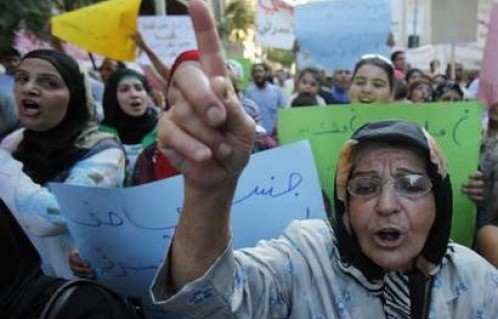Lebanese Politics: More Women Needed
 In 1776, the First Lady of the United States, Abigail Adams, wrote a letter to her husband John and to Congress, imploring her countrymen not to overlook women’s interests. “Remember the ladies,” she urged, adding with considerable defiance: “If particular care and attention is not paid to the ladies we are determined to foment a rebellion and will not hold ourselves bound by any laws in which we have no voice or representation.”
In 1776, the First Lady of the United States, Abigail Adams, wrote a letter to her husband John and to Congress, imploring her countrymen not to overlook women’s interests. “Remember the ladies,” she urged, adding with considerable defiance: “If particular care and attention is not paid to the ladies we are determined to foment a rebellion and will not hold ourselves bound by any laws in which we have no voice or representation.”
More than 230 years later and thousands of miles away in tiny Lebanon, Adams’ words have gained renewed urgency. In mid-June, after five months of intense negotiations, Prime Minister Najib Mikati finally unveiled his new Cabinet. Not one of the 30 appointments he made is a woman.
“Women hold up half the sky”, as the Chinese proverb goes, but in many parts of the world they are still forgotten by the governments that are supposed to represent them.
While the absence of women from political life is less unusual in other Arab countries, like Saudi Arabia, Lebanese women have enjoyed at least symbolic representation in their government since being given the right to vote in 1952. Before the previous government was brought down in January, there were two women in Cabinet, holding the finance and state portfolios, and four women among 128 parliamentarians. Though this figure amounts to a paltry 3.1 per cent, most activists were optimistic it would, with time, gradually increase.
If being deprived a share of the Cabinet wasn’t bad enough for Lebanese women, their role in society has been further called into question by the disappointing comments of the country’s most senior Sunni leader. Grand Mufti Mohammad Qabbani recently condemned efforts to introduce legislation protecting women from domestic violence as a Western plot against Muslim family values.
These seem like strange words indeed when one recalls Lebanese citizen Charles Malik’s pioneering role in drafting the 1948 Universal Declaration of Human Rights – a document firmly committed to ending gender discrimination and one that the Lebanese have enshrined in their Constitution. Qabbani seems to have overlooked the fact that Lebanon helped articulate those very values he now accuses of being foreign and which many other Muslim figures would call an integral part of their religious beliefs.
Unfortunately, the masculinisation of Lebanon’s government is just the latest in a string of major blows to women’s political participation in the Arab world as a whole. Although women were at the helm of the uprisings in Tunisia, Yemen and Egypt, only one has been appointed to the new 27-member cabinet in Cairo and the plans for a woman’s quota introduced last year have been abandoned. In Tunisia, where women formerly held over a quarter of parliamentary seats, they have also been slighted, heading only two of 31 ministries now. Developments in Lebanon thus may well herald the beginning of retrogressive steps on women’s rights throughout the region.
These steps backward, however, increasingly go against the grain of global attitudes towards women, whose participation in decision-making is now an internationally recognised marker of social progress and is on the rise every year. The United Nations has, since 2000, led initiatives to mainstream women’s active role in the public life of their countries, issuing several resolutions in this regard. Lebanon should embrace its historical role as a defender of human rights and implement those resolutions in good faith, especially at a time when it is serving as a rotating member of the Security Council.
Without women, Lebanon’s political jigsaw is glaringly incomplete and calls for transformative change will go unanswered. As one local group put it recently, “How can we arrive at social justice for all when we exclude half of society in the decision-making process?” Women must become an integral part of decision-making bodies if Lebanon wants to enjoy real democracy and truly serve the needs and aspirations of its people.
The political participation of women is a matter of justice, not a privilege they should have to fight for. The sisters of Abigail Adams must not wait any longer for their rights to be heeded.
Dalila Mahdawi is a human rights journalist based between Beirut and London.



You must be logged in to post a comment Login